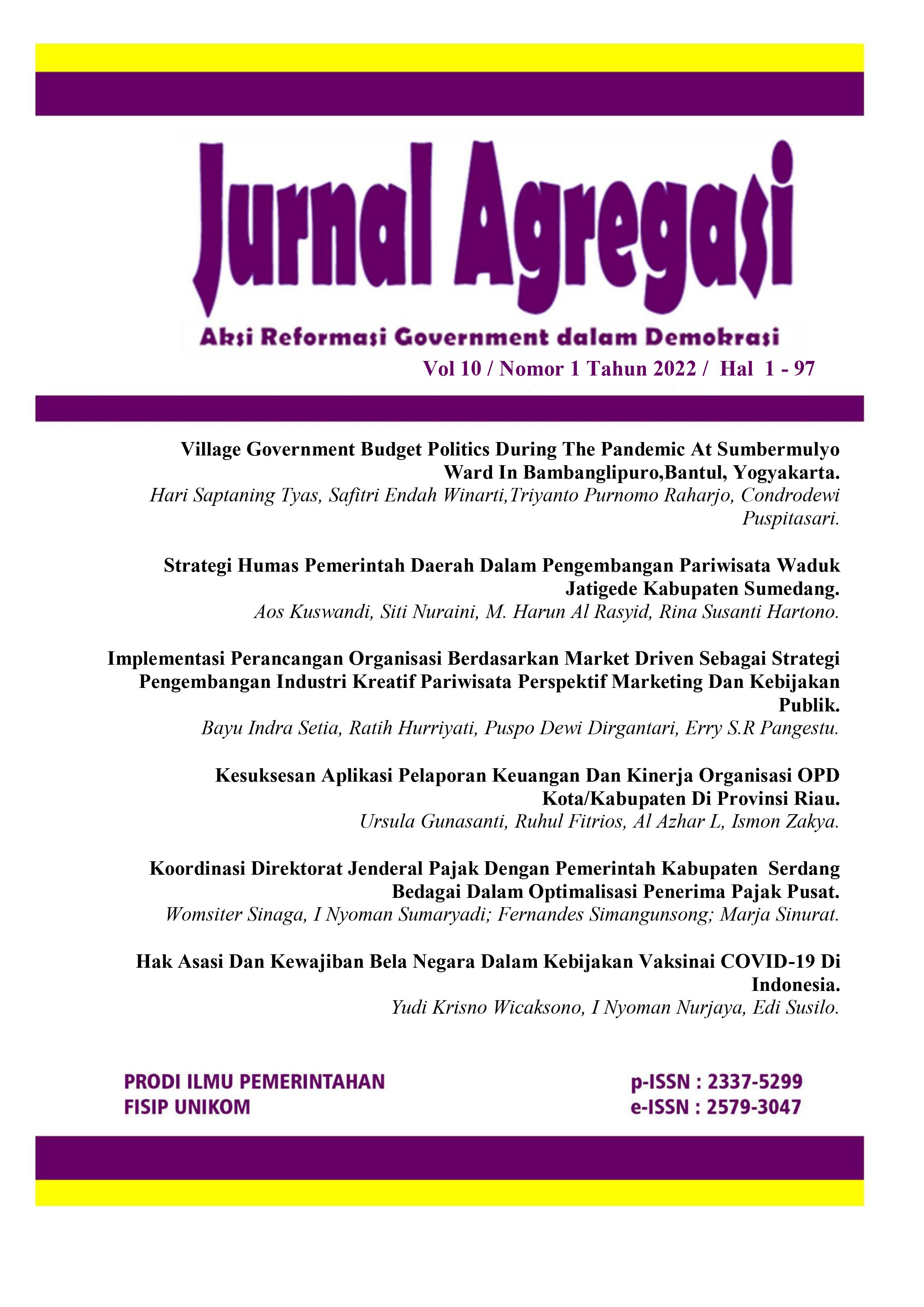IMPLEMENTASI PERANCANGAN ORGANISASI BERDASARKAN MARKET DRIVEN SEBAGAI STRATEGI PENGEMBANGAN INDUSTRI KREATIF PARIWISATA PERSPEKTIF MARKETING DAN KEBIJAKAN PUBLIK
DOI:
https://doi.org/10.34010/agregasi.v10i1.6007Keywords:
market driven, creative industry, tourismAbstract
The purpose of this research is to implement market-based organizational design as a creative tourism industry development strategy to promote tourist destinations. The creative economy not only contributes to several aspects of life from an economic perspective, but also has a positive effect on other aspects, namely social life, business environment, economic improvement and regional image. The method used is a qualitative method using a SWOT analysis of various data. This research produces several strategies that can be carried out by decision makers related to organizational design to get market driven with several strategies that can be developed, namely the development of a sustainable, community-based and comprehensive tourism creative industry, integrated between sectors, and between stakeholders. The concepts offered are the concept of ecotourism, halal tourism and Community-Based Tourism. So that everything can be carried out properly, it must be done with the marketing concept and the institutional concept.
Keywords: market driven, creative industry , tourism.
Downloads
References
Alexandri, M. (2019). Creative industries: Existence of arts traditional industries in Indonesia. Academy of Strategic Management Journal, 18(1). https://api.elsevier.com/content/abstract/scopus_id/85068487194
Aubry, A. (2015). The promotion of creative industries as a tool for urban planning: the case of the Territoire de la culture et de la création in Paris Region. International Journal of Cultural Policy, 21(2), 121–138. https://doi.org/10.1080/10286632.2014.890602
Campbell, P. (2019). Cultural Engagement and the Economic Performance of the Cultural and Creative Industries: An Occupational Critique. Sociology, 53(2), 347–367. https://doi.org/10.1177/0038038518772737
Cemporaningsih, E., Raharjana, D. T., & ... (2020). Ekonomi Kreatif sebagai Poros Pengembangan Pariwisata di Kecamatan Kledung dan Bansari, Kabupaten Temanggung. … Nasional Pariwisata. https://journal.ugm.ac.id/tourism_pariwisata/article/view/60401
Chang, B. Y. (2015). E-commerce applications in the tourism industry: A Tanzania case study. In South African Journal of Business Management (Vol. 46, Issue 4, pp. 53–63). https://doi.org/10.4102/sajbm.v46i4.109
Cocola-Gant, A. (2018). Tourism gentrification. In Handbook of Gentrification Studies (pp. 281–293). https://api.elsevier.com/content/abstract/scopus_id/85048110226
Craven, & Piercy. (2009). Marketing Strategic (9th ed.). Singapore : Mc Graw-Hill companies co.
Font, X. (2017). Sustainability and marketing in tourism: its contexts, paradoxes, approaches, challenges and potential. In Journal of Sustainable Tourism (Vol. 25, Issue 7, pp. 869–883). https://doi.org/10.1080/09669582.2017.1301721
Gong, H. (2017). Exploring the clustering of creative industries. European Planning Studies, 25(4), 583–600. https://doi.org/10.1080/09654313.2017.1289154
Gretzel, U. (2015). Conceptual foundations for understanding smart tourism ecosystems. Computers in Human Behavior, 50, 558–563. https://doi.org/10.1016/j.chb.2015.03.043
Herison, A., Romdania, Y., Akbar, D., & ... (2020). INDEKS KESESUAIAN WISATA TERUMBU KARANG DALAM PENGEMBANGAN PARIWISATA DI LAMPUNG SELATAN. Jurnal Pariwisata …. https://jurnal.unmer.ac.id/index.php/jpp/article/view/2715
Higgins-Desbiolles, F. (2018). Sustainable tourism: Sustaining tourism or something more? Tourism Management Perspectives, 25, 157–160. https://doi.org/10.1016/j.tmp.2017.11.017
Kemendag, 2007: 10.
Kim, S. E. (2017). Effects of tourism information quality in social media on destination image formation: The case of Sina Weibo. Information and Management, 54(6), 687–702. https://doi.org/10.1016/j.im.2017.02.009
Lin, C. Y. (2017). The reputation-building process and spatial strategies of creative industries: A case study of product design firms in Taipei. Environment and Planning A, 49(1), 186–204. https://doi.org/10.1177/0308518X16667297
Liu, H. (2015). Creative industries urban model: Structure and functioning. Proceedings of the Institution of Civil Engineers: Urban Design and Planning, 168(2), 88–100. https://doi.org/10.1680/udap.13.00014
Mulya, I. S., Hernawan, D., & Fitriah, M. (2020). Pengembangan Pariwisata Kabupaten Sukabumi Melalui Tagline Gurilapss Pesona Sukabumi. Jurnal Komunikatio. https://www.unida.ac.id/ojs/JK/article/view/3360
Nur, I., & Syafri, S. (2020). Dampak Pengembangan Pariwisata Terhadap Ekonomi Lokal (Studi Kasus Desa Pao). In … Nasional Hasil Penelitian & Pengabdian Kepada …. jurnal.poliupg.ac.id. http://jurnal.poliupg.ac.id/index.php/snp2m/article/download/2535/2247
Perda Kabupaten Bandung No. 6 Tahun 2006 Tentang Rencana Induk Pengembangan Pariwisata Daerah (RIPPDA) Kabupaten Bandung.
Santoro, G. (2020). Collaborative modes with Cultural and Creative Industries and innovation performance: The moderating role of heterogeneous sources of knowledge and absorptive capacity. Technovation, 92. https://doi.org/10.1016/j.technovation.2018.06.003
Schuckert, M. (2015). Hospitality and Tourism Online Reviews: Recent Trends and Future Directions. Journal of Travel and Tourism Marketing, 32(5), 608–621. https://doi.org/10.1080/10548408.2014.933154
Stainton, H. (2016). A segmented volunteer tourism industry. Annals of Tourism Research, 61, 256–258. https://doi.org/10.1016/j.annals.2016.09.011
Tekin, E. (2015). The impacts of political and economic uncertainties on the tourism industry in Turkey. Mediterranean Journal of Social Sciences, 6(2), 265–272. https://doi.org/10.5901/mjss.2015.v6n2s5p265
Tung, V. W. S. (2017). The potential for tourism and hospitality experience research in human-robot interactions. In International Journal of Contemporary Hospitality Management (Vol. 29, Issue 10, pp. 2498–2513). https://doi.org/10.1108/IJCHM-09-2016-0520
Undang-Undang Nomor 10 Tahun 2009 tentang Kepariwisataan.
Downloads
Published
Issue
Section
License
This work is licensed under :

Creative Commons Attribution-NonCommercial 4.0 International License









